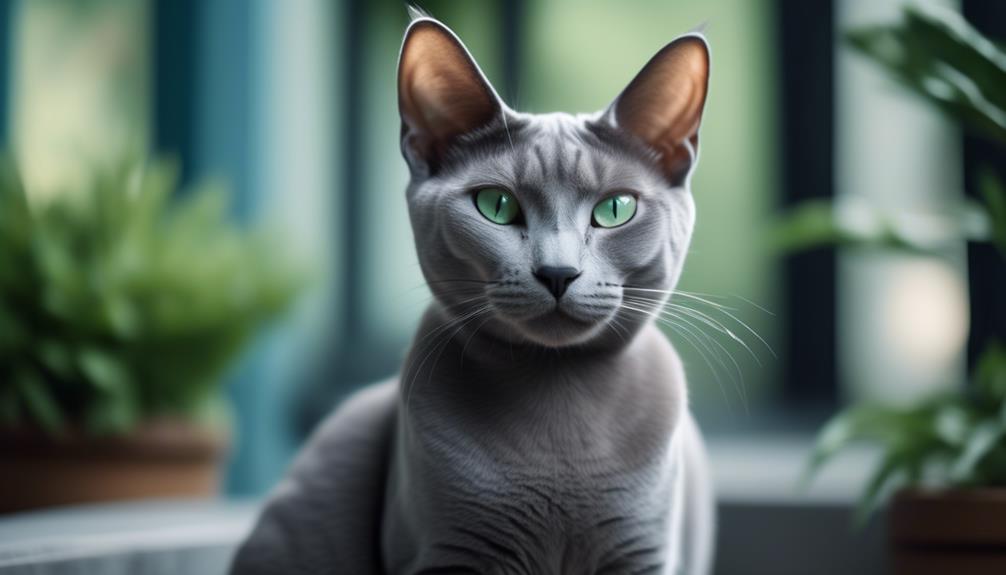
In a world dominated by feline breeds like the Maine Coon and Siamese, the Korat cat quietly stands out with its timeless elegance and enigmatic charm.
With its roots tracing ancient Siam, this breed has a rich history intertwining with legends and cultural significance.
But what sets the Korat apart from the rest? What are its unique characteristics and traits that make it a desirable companion?
In this discussion, we will delve into the captivating world of the Korat cat, unraveling its secrets and uncovering why it continues to captivate cat lovers around the globe.
Key Takeaways
- The Korat cat breed is originally from Thailand and is known for its distinctive silver-tipped blue coat.
- Korats are intelligent, playful, and affectionate cats that require moderate exercise and are easy to train.
- They have a 12-15-year lifespan and generally require little grooming except for weekly combing to remove dead hairs.
- When adopting a Korat, it is important to prioritize rescue organizations or reputable breeders who prioritize health and temperament.
Origin and Size
The Korat cat breed, originating from Thailand, is a medium-sized feline that typically weighs between 6 to 10 pounds.
These cats have a compact and muscular body with a balanced structure.
They have a round head and large, wide-set green eyes that turn amber as they age.
One of the most distinctive features of the Korat is its striking silver-tipped blue coat.
The short, dense, and silky fur adds to their elegant appearance.
In addition to their physical characteristics, Korats are known for their intelligence, playfulness, and affectionate nature.
They enjoy being social and forming strong bonds with their human companions.
Despite their small size, they have a big personality and are often described as having a heart of gold.
See another cat breed profile.
Kurilian Bobtail Cat Breed
Breed Group and Lifespan
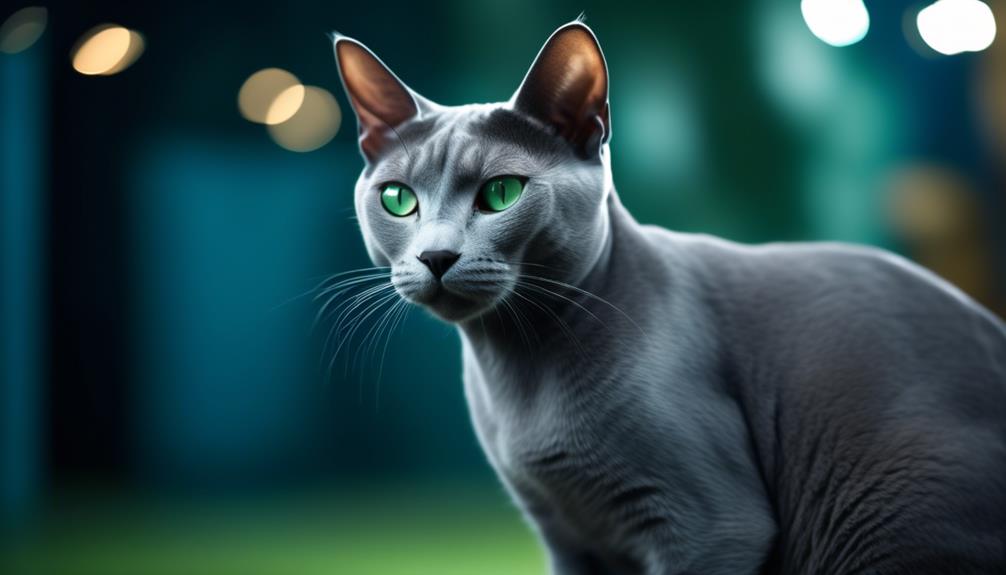
The Korat cat breed falls into the shorthair group and has an average lifespan of 12 to 15 years.
As a shorthair breed, their coat is short, dense, and silky, with a distinctive silver-tipped blue color.
Korats are known for their striking silver-blue coats, large green eyes that turn amber with age, and heart-shaped heads with large ears.
In terms of lifespan, Korats have a relatively long life expectancy, living on average between 12 to 15 years.
Owners must provide a nurturing environment for their Korat companions, as they’re intelligent, playful, and affectionate cats that prefer to stay close to their people.
Regular grooming, exercise, and proper healthcare can help ensure their well-being and longevity.
Coat and Temperament
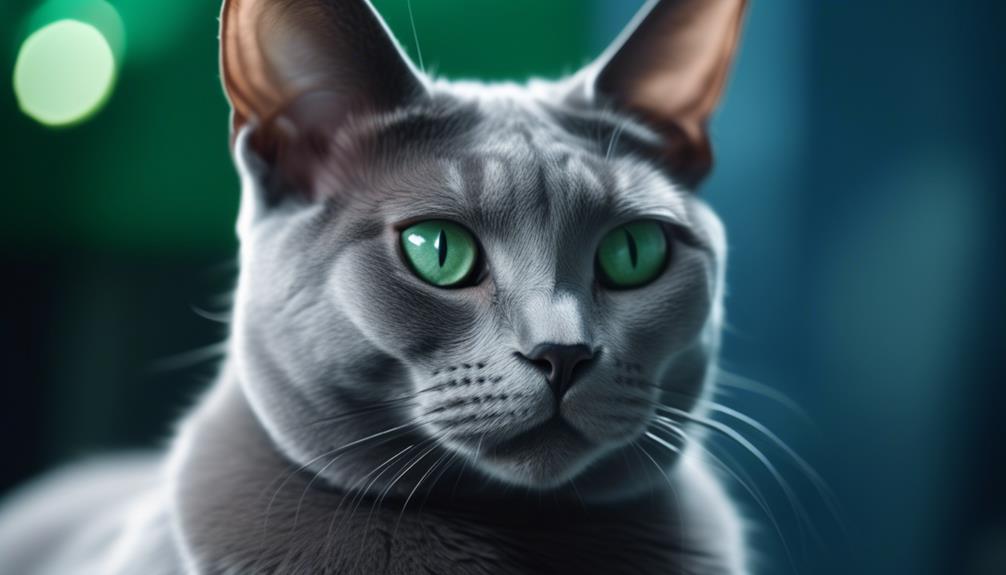
With its striking silver-blue coat and distinctive silver-tipped fur, the Korat cat exudes elegance and beauty.
This breed is known for its short, dense, and silky coat, unique with its silver-tipped blue color.
The Korat’s coat isn’t only visually appealing but also requires little grooming, with just weekly combing to remove dead hairs.
Apart from its stunning coat, the Korat is also admired for its temperament.
These cats are intelligent, playful, and affectionate, making them wonderful companions.
They’re known to form strong bonds with their owners and prefer to stay close by.
However, it’s important to provide them with companionship and not leave them alone for extended periods to prevent behavior problems.
Exercise Needs and Training
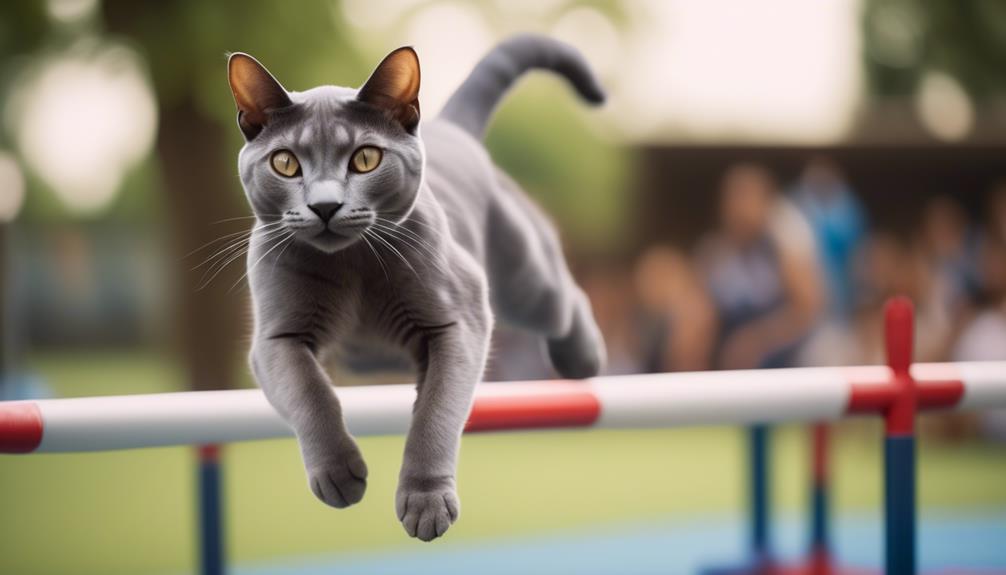
After discussing the Korat cat’s striking coat and affectionate temperament, it’s important to understand their exercise needs and training requirements.
- Regular exercise: The Korat cat has moderate exercise needs, so providing them with opportunities to stay active and engaged is crucial. This can include interactive play sessions with toys or even gentle walks on a leash.
- Mental stimulation: These intelligent cats thrive on mental stimulation, so incorporating puzzle toys and interactive games into their daily routine can help keep them mentally sharp and prevent boredom.
- Positive reinforcement training: Korats are known to be easy to train, so using positive reinforcement techniques such as treats and praise can be highly effective in teaching them new behaviors and tricks.
Grooming and Health
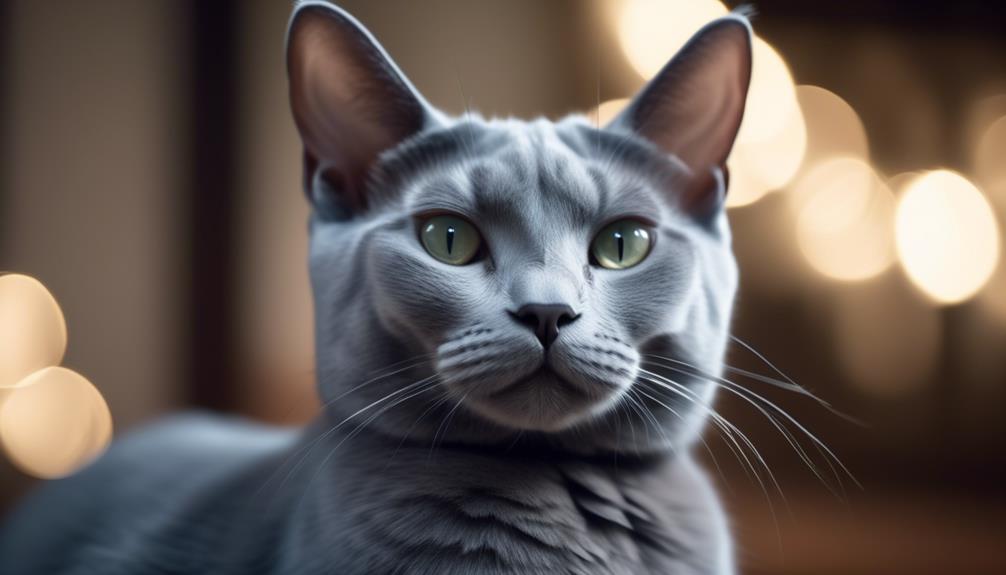
Regular grooming and good health are essential to caring for a Korat cat.
Despite their short coat, Korats still require grooming to keep them looking their best.
Weekly combing is recommended to remove dead hairs and prevent matting.
This helps keep their coat clean and shiny and reduces the amount of shedding around the house.
In addition to grooming, it’s important to prioritize the overall health of the Korat.
This breed is generally healthy, but they can be sensitive to anesthesia due to their low body fat.
It’s also important to know about genetic diseases such as GM1 and GM2 gangliosidosis.
Regular veterinary check-ups and proper care can help ensure your Korat remains happy and healthy for many years.
Historical Significance
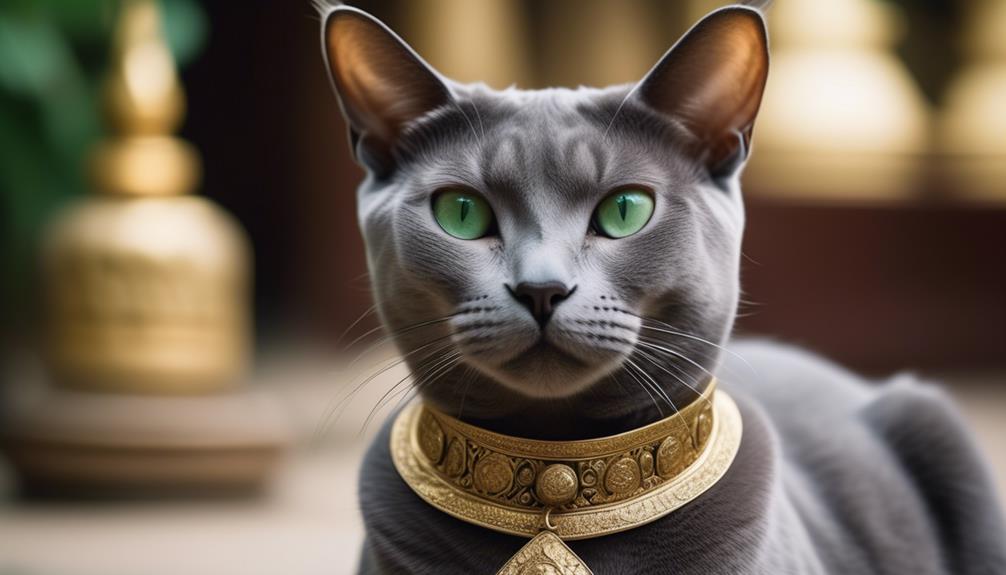
The Korat cat breed holds great historical significance, particularly in its native country of Thailand.
This breed has a rich and fascinating history that evokes a sense of wonder and admiration.
Here are three reasons why the Korat is culturally significant:
- Considered a living good-luck charm in Thailand, the Korat is believed to bring prosperity and fertility to its owners.
- Korats are often presented in pairs as gifts, especially to brides, symbolizing a wish for a happy and abundant life.
- The name ‘Korat’ is derived from the region in northeast Thailand where they originated, adding to their cultural significance.
These cultural beliefs and traditions surrounding the Korat cat breed highlight its special place in Thai society and make it a cherished and revered feline companion.
Gifting Tradition
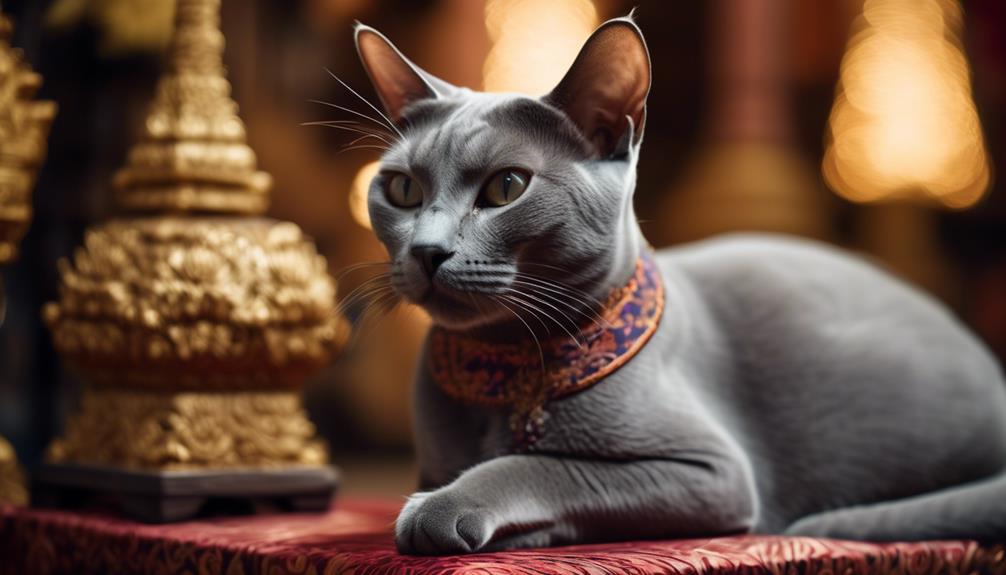
To honor the cultural significance of the Korat cat breed, the gifting tradition surrounding these felines is deeply rooted in Thai customs and beliefs.
Korats are often presented as gifts, especially to brides, as they symbolize prosperity and fertility.
This tradition stems from the belief that owning a Korat brings good luck and blessings to the household.
The name ‘Korat’ itself is derived from the region in northeast Thailand where they originated.
This gifting tradition has continued for many years, and the first known Korats were imported into the United States in 1959.
Whether as a symbol of good luck or simply as a cherished companion, the Korat cat holds a special place in Thai culture and traditions.
Name and Origin
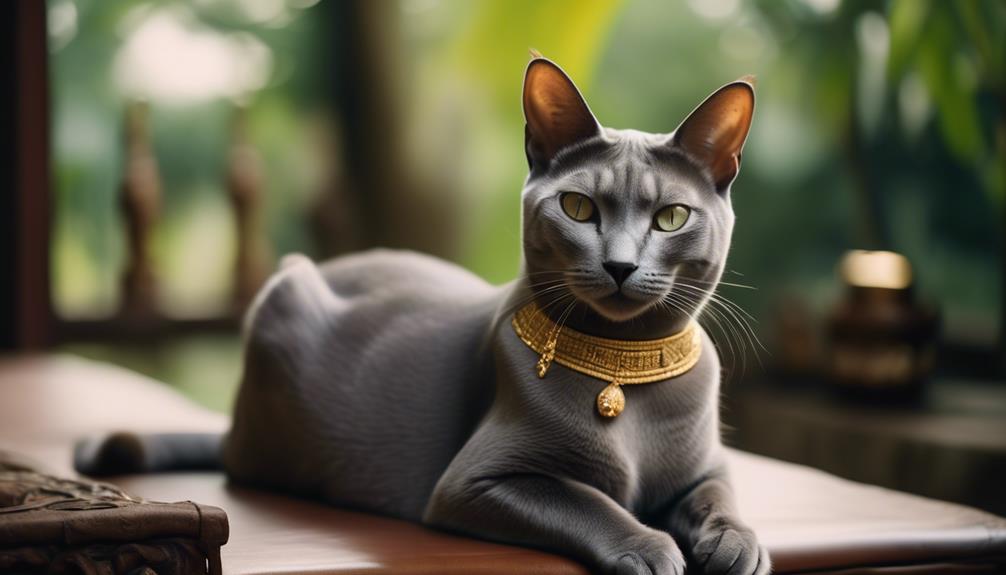
Deriving its name from the region in northeast Thailand where it originated, the Korat cat breed holds a unique significance in Thai culture and traditions.
This breed is deeply intertwined with the history and heritage of Thailand, making it a cherished part of the country’s identity.
Here are three reasons why the name and origin of the Korat cat breed evoke an emotional response:
- Cultural heritage: The Korat cat breed carries a rich cultural heritage, symbolizing good luck and prosperity in Thai society. This connection to tradition and folklore adds a sense of mystique and enchantment to the breed.
- Symbol of love: Korat cats are often presented as gifts, especially to brides, to bestow blessings of fertility and prosperity. This act of gifting showcases the deep affection and care that the breed represents.
- Historical significance: The Korat cat breed has a long history, with the first known Korats imported into the United States in 1959. This historical connection adds a sense of nostalgia and reverence to the breed, making it even more special.
Introduction to the United States
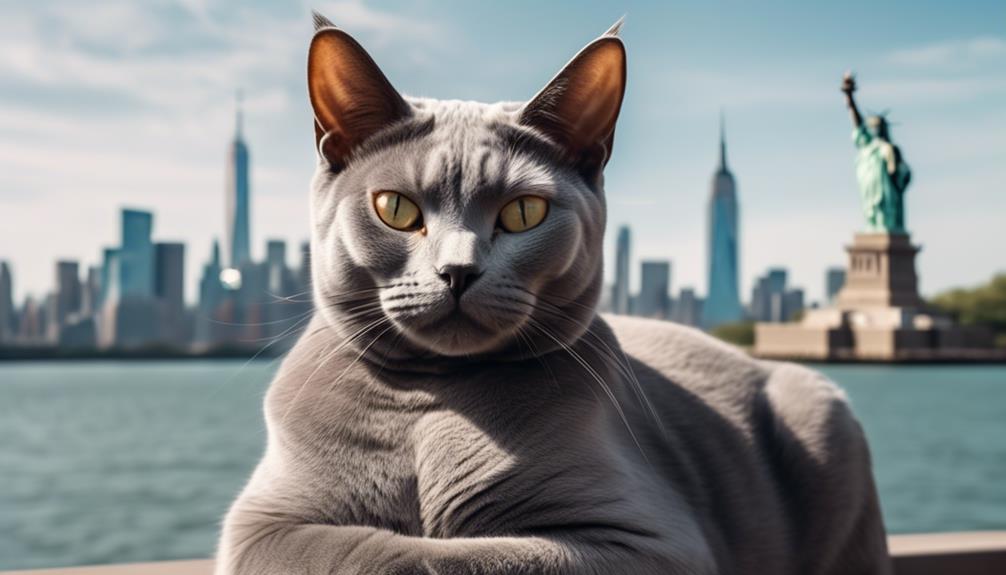
After being imported into the United States in 1959, the Korat cat breed gained popularity among cat enthusiasts.
With its unique silver-tipped blue coat and distinctive physical characteristics, the Korat quickly captured the attention and hearts of many.
Known for their intelligence, playfulness, and affectionate nature, Korats make wonderful companions.
They’re easy to train and require moderate exercise.
Despite their moderate size, weighing between 6 to 10 pounds, Korats have a strong presence and are possessive of their people.
They prefer to stay close by and do best with companionship.
It’s important to provide a nurturing environment for Korats, as they can develop behavior problems if left alone or ignored.
With their striking appearance and loving personality, it’s no wonder cat lovers in the United States continue to cherish the Korat.
Adoption and Breeder Selection
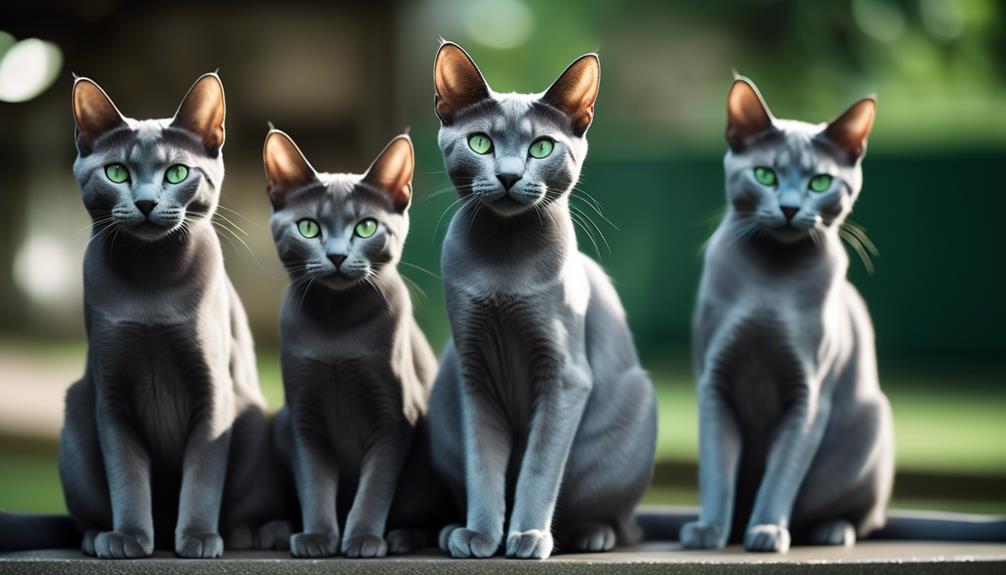
Imported into the United States in 1959, the Korat cat breed quickly gained popularity among cat enthusiasts, leading to a growing interest in adoption and finding reputable breeders.
When adopting a Korat, it’s important to prioritize rescue organizations or shelters to give these beautiful cats a second chance at a loving home.
However, if purchasing a Korat kitten is preferred, it’s crucial to choose a reputable breeder.
Conducting thorough research ensures that ethical breeding practices are followed, prioritizing the health and temperament of the kittens.
Reputable breeders also conduct necessary health screenings to ensure the well-being of the cats.
Providing a Nurturing Environment
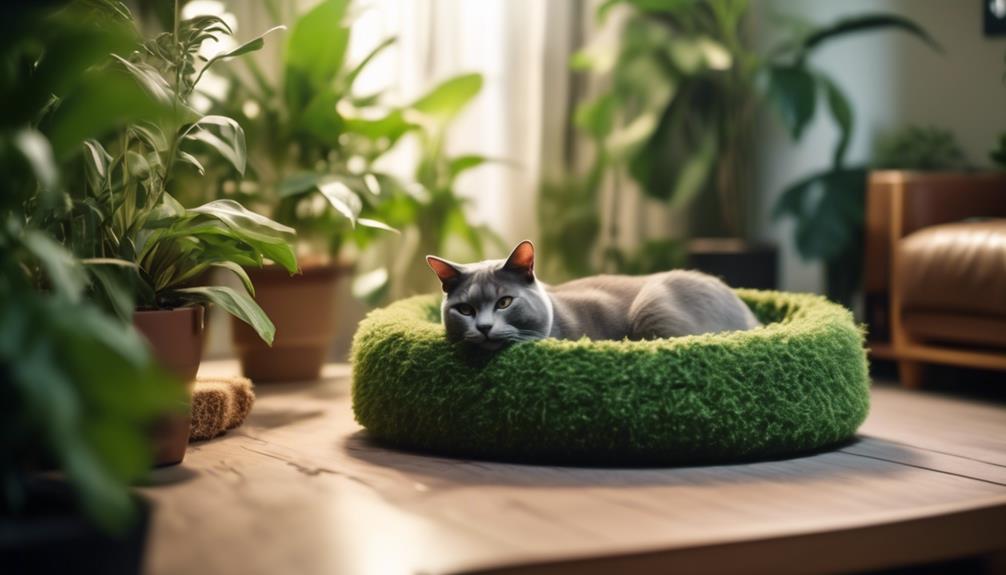
When creating a nurturing environment for a Korat cat, it’s important to provide the necessary care and attention they require.
Korats are intelligent and affectionate cats that thrive on companionship.
They prefer to stay close to their people and can develop behavior problems if left alone or ignored.
To ensure their well-being, it’s crucial to keep them in an indoor-only environment and provide them with regular playtime and interaction.
Additionally, maintaining a clean litter box is essential for their comfort.
While their short, dense coat requires minimal grooming, weekly combing to remove dead hairs is recommended.
Brushing their teeth regularly and trimming their nails every few weeks will improve their overall health and well-being.
Personality and Care
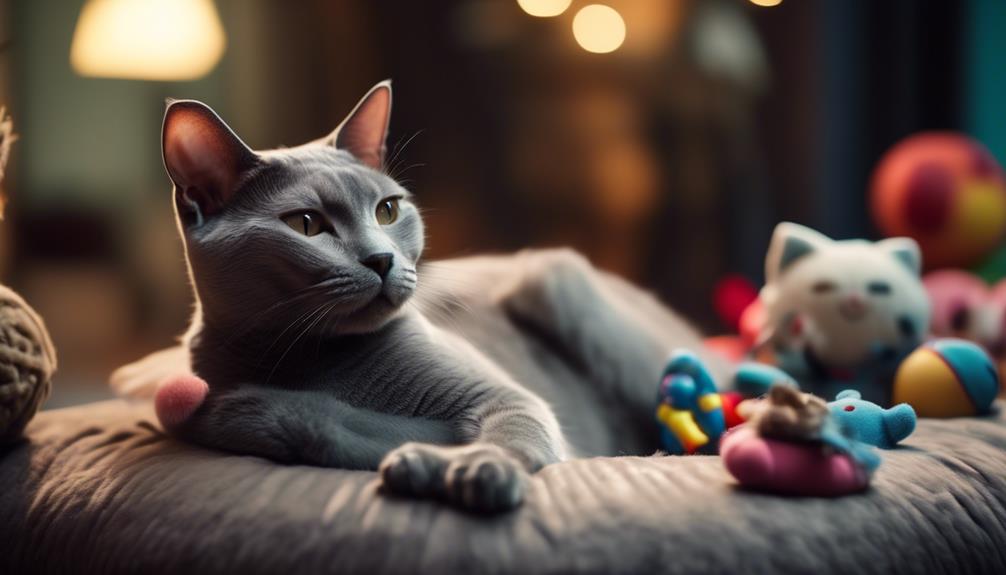
To properly care for a Korat cat and understand their unique personality, it’s crucial to provide them with the attention and companionship they crave.
These cats are smart and opinionated, often becoming possessive of their people.
They prefer to stay close by and do best with companionship, so it’s essential to avoid leaving them alone or ignoring them for extended periods.
Neglecting their social needs can lead to behavior problems.
Additionally, Korats require little grooming, with weekly combing to remove dead hairs being sufficient.
It’s also important to brush their teeth regularly to prevent periodontal disease and trim their nails every few weeks.
Lastly, keeping their litter box clean and providing an indoor-only environment is necessary for their well-being.
Frequently Asked Questions
Are Korat Cats Hypoallergenic?
No, Korat cats are not hypoallergenic.
While they have a short, dense, and silky coat, they still produce allergens that can trigger allergies in sensitive individuals.
Regular grooming and cleaning can help reduce allergens.
Do Korat Cats Get Along Well With Other Pets?
Korat cats generally get along well with other pets.
They enjoy companionship and prefer to stay close to their people.
However, proper introductions and gradual acclimation are important for a harmonious multi-pet household.
How Often Should a Korat Cat Be Bathed?
A Korat cat should be bathed every 4-6 weeks to keep its coat clean and healthy.
Regular bathing helps to remove dirt and oils from the fur, maintaining its beautiful silver-blue color.
Can Korat Cats Be Trained to Do Tricks?
Korat cats can be trained to do tricks.
They are intelligent and easy to train.
With patience and positive reinforcement, they can learn various tricks and commands.
Training sessions should be kept short and engaging.
Are Korat Cats Prone to Any Specific Allergies?
Korat cats are generally not prone to any specific allergies.
However, like all cats, they can develop allergies to certain foods, environmental factors, or substances.
It is important to monitor their health and consult a veterinarian if allergies or sensitivities arise.
Conclusion
In conclusion, the Korat cat is a fascinating breed with its unique silver-tipped blue coat and affectionate nature.
Their moderate exercise needs and easy trainability make them a great choice for first-time cat owners.
While they require minimal grooming, knowing their sensitivity to anesthesia and potential genetic diseases is important.
Whether you’re a long-time cat lover or considering adding a feline companion, the Korat cat will capture your heart.




